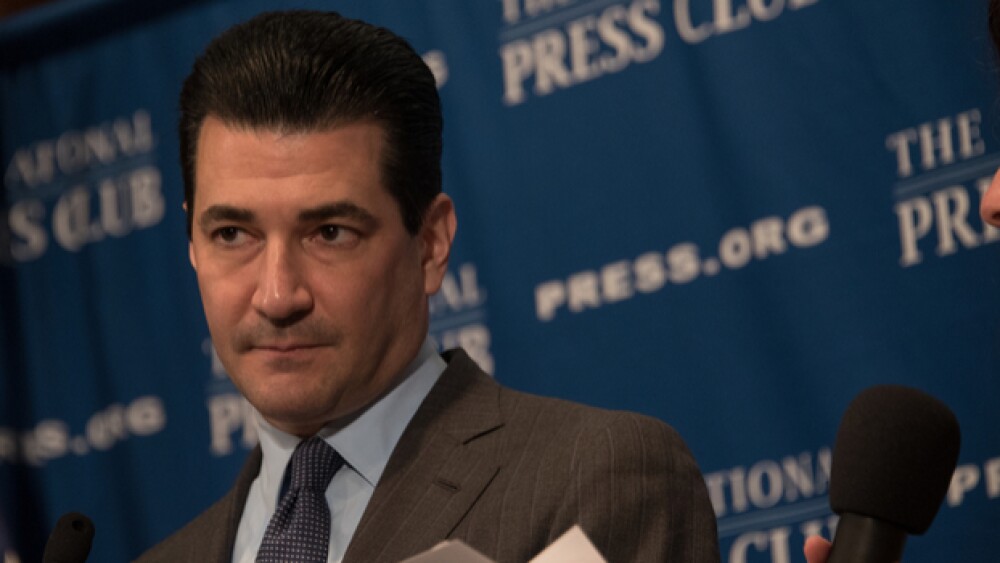Gottlieb said the FDA believes there should be a premarket demonstration that a new opioid is superior to an already-approved opioid.
Albert H. Teich / Shutterstock
Although Scott Gottlieb’s bags may be packed as he nears the end of his tenure as head of the U.S. Food and Drug Administration (FDA), he is still pushing for changes in combatting the opioid crisis, a mission he has championed since taking over at the regulatory agency.
On Thursday, Gottlieb, who announced his resignation earlier this month, appeared before a U.S. Senate Appropriations Subcommittee to seek an additional $55 million in the proposed budget to address opioids. Gottlieb is calling for new standards for the approval of opioids, including considering the comparative advantage of new opioid approvals relative to other opioids already on the market. Gottlieb said the FDA believes there should be a premarket demonstration that a new opioid is superior to an already-approved opioid or opioid-containing drug for the same general indication. Such a standard would help the agency better address the opioid crisis, he said. The outgoing commissioner said the FDA’s goal for this type of approach is to include “abuse-deterrent formulations to promote continued innovation in abuse deterrence properties.”
Gottlieb noted that the FDA would not ask this question of drugs for other indications but added that opioids are different. He said it’s a fair question to ask in the setting of an addiction crisis.
“We need to continue to act swiftly and forcefully to get ahead of this crisis. We need to consider novel policy options that are narrowly tailored to opioids. We need to recognize that this crisis is going to be hard to fully reverse. We need to be willing to embrace actions in the setting of opioids that we must accept would be unsuitable to any other drug category. A comparative advantage standard for new opioid drug approvals is one such approach,” Gottlieb said. “That is the lesson we’ve learned from this crisis. And so it’s reasonable to ask these questions here.”
In his comments to the Senate, Gottlieb called the opioid crisis the biggest public health crisis” that has been facing the FDA and the nation. In his address, Gottlieb noted that the beginnings of the crisis were tied to prescription medicines that had been prescribed lawfully “but far too loosely.” He added that the opioid crisis has evolved beyond prescription pain medicine to illegal drugs like powerful fentanyl.
“But the fact remains that we still need to take more steps to rationalize prescribing, and too many prescriptions are still being written, and they’re being prescribed for durations of use that are too long for the underlying indication,” Gottlieb said in his statement to the subcommittee.
The additional $55 million being requested to combat the opioid crisis is necessary, Gottlieb said. He noted that the agency and nation are “very far away from fully addressing” the crisis, which was formed over many years and involved missteps and missed opportunities. He said a comprehensive approach is needed to reverse the problem. The additional funding would go to continue to build on investments the FDA has made in reducing the opioid crisis, including efforts to decrease exposure and prevent new addiction; support treatment of those people with opioid abuse disorder; promote novel pain therapies that are not based on opioids; and assessing the benefit-risk of opioids, Gottlieb said.
Additionally, Gottlieb told the Senate subcommittee members that the FDA has already begun to implement new powers granted to the agency through the SUPPORT Act, including a requirement that some opioid manufacturers provide unit-of-use packaging for the immediate release formulations of the painkillers. This makes it easier to prevent overprescribing of the drugs. During his address, Gottlieb said if immediate-release painkillers like Vicodin and Percocet were available in these small-dose packs, more doctors would use this option and forego writing prescriptions for 30-day supplies.
In February, the FDA drafted new guidance plans to address the opioid crisis.





